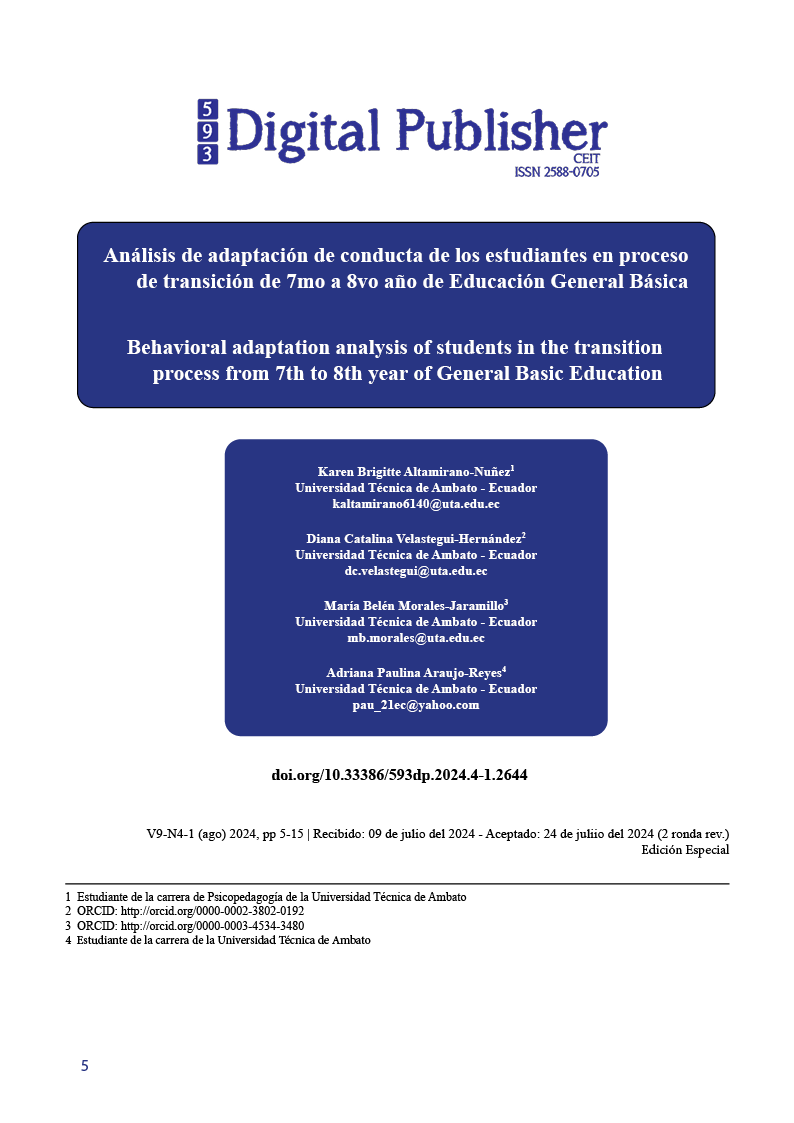Behavioral adaptation analysis of students in the transition process from 7th to 8th year of General Basic Education
Main Article Content
Abstract
The present research deals with the analysis of behavioral adaptation of students in the transition process from 7th to 8th year of General Basic Education at the Basic Education School "Sergio Quirola" belonging to the Ambato canton in the province of Tungurahua. Behavioral adaptation comprises the ability to adjust our behavior to different situations, including social interaction, emotional management, academic performance and adaptation to different contexts. During the transition from elementary school to high school, students face significant challenges in their academic, social, personal and family process. One of the factors of change highlighted during this stage is physiological and hormonal development, which can influence their adaptation. A cross-sectional, non-experimental research methodology was used in this study. The Behavioral Adaptation Inventory (BAI) was used to evaluate the general adaptation level of students when moving from 7th to 8th grade, applying this inventory to the same students in both years. The results showed a significant change in the students when changing environment in their transition process, thus giving an important point to improve in the identification of these changes and difficulties that these students present and thus promote activities that encourage the development of social and emotional skills, as well as establish an open and effective communication with families, which can actively support the process of adaptation of their children. These collaborative and proactive actions can contribute significantly to improving the well-being and performance of students during this stage of educational transition.
Downloads
Article Details

This work is licensed under a Creative Commons Attribution-NonCommercial-ShareAlike 4.0 International License.
1. Derechos de autor
Las obras que se publican en 593 Digital Publisher CEIT están sujetas a los siguientes términos:
1.1. 593 Digital Publisher CEIT, conserva los derechos patrimoniales (copyright) de las obras publicadas, favorece y permite la reutilización de las mismas bajo la licencia Licencia Creative Commons 4.0 de Reconocimiento-NoComercial-CompartirIgual 4.0, por lo cual se pueden copiar, usar, difundir, transmitir y exponer públicamente, siempre que:
1.1.a. Se cite la autoría y fuente original de su publicación (revista, editorial, URL).
1.1.b. No se usen para fines comerciales u onerosos.
1.1.c. Se mencione la existencia y especificaciones de esta licencia de uso.
References
Barreto, M. R. (2023). Diferencias e influencia en la Conducta Adaptativa por las regiones colombianas. Redalyc. https://doi.org/https://doi.org/10.21500/19002386.6280
Cordova, K. (2022). La personalidad y conducta adaptativa en los estudiantes de la Unidad Educativa “Pedro Vicente Maldonado.”. https://revista.redipe.org/index.php/1/article/view/1827
Crespo Fernández, E. C. (s.f.). Conducta adaptativa y funcionamiento ejecutivo en niños con trastorno por déficit de atención con hiperactividad. https://doi.org/http://orcid.org/0000-0001-8467-005X
Departamento de I+D+i. (2015). Inventario de Adaptación de Conducta. TEA Ediciones. https://selcap.cl/wp-content/uploads/2019/11/IAC-Manual-EXTRACTO.pdf
Duran Pozo, G. C. (2021). La actitud emocional en la conducta alimentaria en los niños y niñas de 3 a 4 años. 323663703_Adaptive_behaviour_and_learning_in_children_with_neurodevelopmental_disorders_autism_spectrum_disorders_and_attention_deficit_hyperactivity_disorder_Effects_of_executive_functioning
Faneite, S. F. (2023). Los enfoques de investigación en las Ciencias Sociales. REVISTA LATINOAMERICANA OGMIOS. https://doi.org/https://doi.org/10.53595/rlo.v3.i8.084
Fiallos, K. M. (2022). Relación entre la conducta antisocial y delictiva con la funcionalidas familiar en adolescentes. https://doi.org/https://doi.org/10.17979/reipe.2024.11.1.10616
Francés, M. Á., Pérez, M. C., & Baquero, A. B. (2022). Factores que facilitan y dificultan la transición de educación primaria a secundaria. https://doi.org/https://doi.org/10.6018/rie.441441
Gamboa Salinas, J. M. (2021). Caracterización de la conducta adaptativa en escolares con y sin discapacidad intelectual de la región de la Araucanía. https://doi.org/https://doi.org/10.15332/s1794-9998.2016.0001.02
Rodríguez, R., & Cantero, M. (2020). Impacto en la educación de la teoría cognitiva social del aprendizaje. https://doi.org/https://doi.org/10.14422/pym.i384.y2020.011
Valgañon, M. (2022). Propuesta de intervención para mejorar las habilidades adaptativas en adolescentes con discapacidad intelectual. Pontifica Universidad Catolica Del Ecuador,. https://doi.org/https://doi.org/10.22199/S07187475.2014.0002.00001





